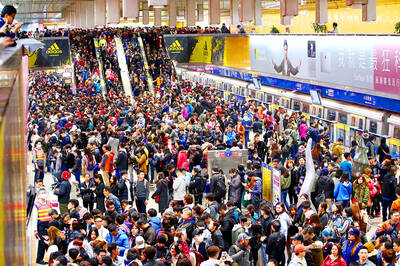The Supreme Prosecutors’ Office on Friday said that it cannot accept the Taiwan High Court’s ruling on Farglory Land Development Co (遠雄建設) chairman Chao Teng-hsiung (趙藤雄), while legal experts said that the ruling seemed to serve wealthy and powerful elites.
The Taiwan High Court on Friday sentenced Chao to two years in prison for paying bribes to secure the contracts for three housing construction projects, with the sentence suspended for five years.
Chao was also fined NT$200 million (US$6.1 million) and had his civil rights suspended for two years. As Chao was not guilty of a major offense, the court’s verdict was final.
A statement issued by the Supreme Prosecutors’ Office said it will not rule out filing an extraordinary appeal.
“Our nation’s laws have always been lenient on people who paid bribes. Oftentimes when they are caught, they admit to wrongdoing and receive reduced punishments or suspended sentences. I was not too surprised at the outcome of Chao’s trial,” former Judicial Reform Foundation executive director Kao Yung-cheng (高涌誠) said.
When the court allowed Chao, who is the head of a large corporation and owns great personal wealth, to make a donation in lieu of serving a prison term, Kao said it re-enforced the commonly-held perception that Taiwan’s legal system “lets the defendant live if they are rich, but receive the death sentence if they are poor.”
“It seems the courts are now exclusively in the service of wealthy and powerful elites,” Kao said.”
Lawyer Chou Wu-jung (周武榮) said that Chao’s belated admission to all the charges in the extra hearing session two weeks ago must have had very little influence on the ruling.
“To give Chao a suspended sentence in this case does not conform with the spirit of the law,” Chou said. “Also, the financial gains Chao has made through bribing government officials to secure construction projects most likely exceeded the amount he was ordered to pay as a donation, which is NT$200 million. For most people, it is very difficult to accept the trial’s outcome.”
Chou said that to implement the legal practice of granting reduced punishments to those who admit to being guilty, the admission must help the investigation and the trial.
“It is supposed to help clarify the details of the case and to reveal the nature of the crime. However, Chao and his company executive Wei (魏) only pleaded guilty to all charges just before the court was to announce its decision for the second ruling on the case,” he said, referring to former Farglory deputy chairman Wei Chun-hsiung (魏春雄), a codefendant in the case, who also pleaded guilty to the charges at the extra hearing, and received a sentence of 22 months in prison, suspended for five years, as well as a fine of NT$100 million.
“At that time, the judicial system had already spent resources on the investigation and legal proceedings of the case. The defendants’ crimes were more or less clear to most people by then,” Chou said.
“However, the High Court handed out lenient sentences to Chao and Wei, and allowed them to donate a sum of money in lieu of serving jail time. The ruling was clearly contrary to the spirit of the law, regarding sentence reduction,” he said.
Chao and Wei pleading guilty that late into the trial and still being rewarded with leniency would let others suspects to follow suit, Chou said.

People can take the Taipei MRT free of charge if they access it at Nanjing Sanmin Station or Taipei Arena Station on the Green Line between 12am and 6am on Jan. 1, the Taipei Department of Transportation said on Friday, outlining its plans to ease crowding during New Year’s events in the capital. More than 200,000 people are expected to attend New Year’s Eve events in Taipei, with singer A-mei (張惠妹) performing at the Taipei Dome and the city government’s New Year’s Eve party at Taipei City Hall Plaza, the department said. As people have tended to use the MRT’s Blue or

Civil society groups yesterday protested outside the Legislative Yuan, decrying Chinese Nationalist Party (KMT) efforts to pass three major bills that they said would seriously harm Taiwan’s democracy, and called to oust KMT caucus whip Fu Kun-chi (傅?萁). It was the second night of the three-day “Bluebird wintertime action” protests in Taipei, with organizers announcing that 8,000 people attended. Organized by Taiwan Citizen Front, the Economic Democracy Union (EDU) and a coalition of civil groups, about 6,000 people began a demonstration in front of KMT party headquarters in Taipei on Wednesday, organizers said. For the third day, the organizers asked people to assemble

Taipei is participating in Osaka’s Festival of Lights this year, with a 3m-tall bubble tea light installation symbolizing Taiwan’s bubble tea culture. The installation is designed as a bubble tea cup and features illustrations of Taipei’s iconic landmarks, such as Taipei 101, the Red House and North Gate, as well as soup dumplings and the matchmaking deity the Old Man Under the Moon (月下老人), affectionately known as Yue Lao (月老). Taipei and Osaka have collaborated closely on tourism and culture since Taipei first participated in the festival in 2018, the Taipei City Department of Information and Tourism said. In February, Osaka represented

Taiwanese professional baseball should update sports stadiums and boost engagement to enhance fans’ experience, Chinese Professional Baseball League (CPBL) commissioner Tsai Chi-chang (蔡其昌) told the Liberty Times (sister paper of the Taipei Times) in an interview on Friday. The league has urged Farglory Group and the Taipei City Government to improve the Taipei Dome’s outdated equipment, including relatively rudimentary television and sound systems, and poor technology, he said. The Tokyo Dome has markedly better television and sound systems, despite being 30 years old, because its managers continually upgraded its equipment, Tsai said. In contrast, the Taipei Dome lacked even a room for referees